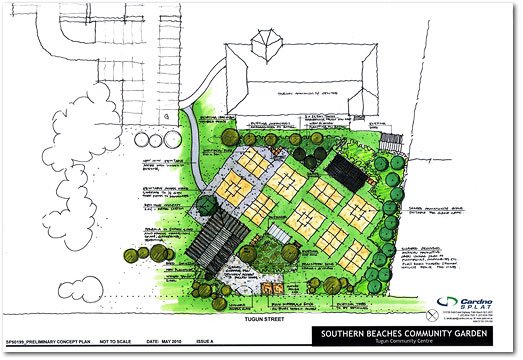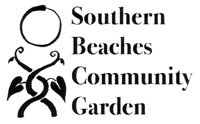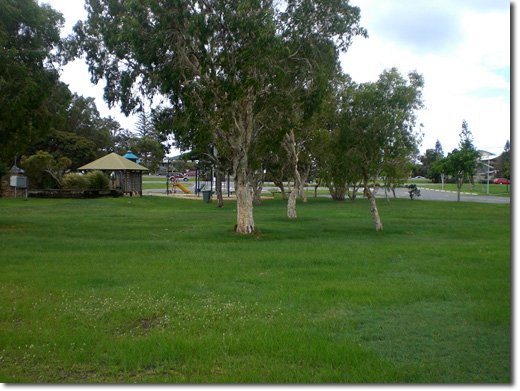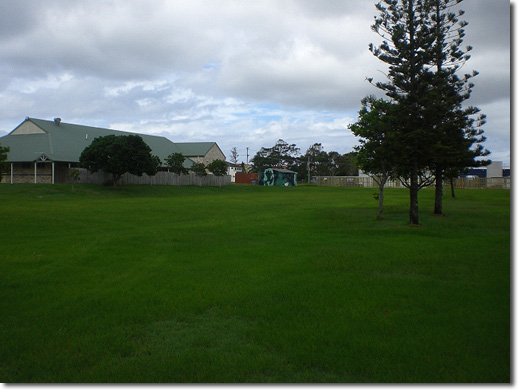


|
Commenced:
|
01/12/2009 |
|---|---|
|
Submitted:
|
06/02/2011 |
|
Last updated:
|
07/10/2015 |
|
Location:
|
Tugun Street , Tugun, Queensland, AU |
|
Phone:
|
0417010965 |
|
Website:
|
www.gcparks.com.au/activities.aspx?page=159 |
|
Climate zone:
|
Sub-tropical |
There is great public support with more than 100 members for the Southern Beaches Community Garden. The gardens are located off Tugun Street on the vacant land behind the Tugun Community Hall. The gardens are planned to comprise a community section, private plots and an educational program. For further information or to register your interest, please contact Margot James on 0416 153 578 or email [email protected] The gradens are sponsored by Bendigo Bank.

Note: This is a preliminary concept plan only. As the garden develops, further
consultation will be undertaken with the members and other stakeholders
to drive the finished ‘product’. The garden will be organic and will incorporate
many Permaculture design principles.
What: Queensland Southen Beaches Community Gardens Open Day and Working Bee
When: Saturday 31 July 2010, from 1pm (Sausage sizzle from 3pm, finish by 4pm)
Where: Tugun Community Centre (Please bring own gardening tools.)
 During my internship (at the Permaculture Research Institute Aus) I had the privilege of getting involved with some dedicated community minded people. I met Margot James, a focused, determined lady on a mission to set the ball rolling on a project called Southern Beaches Community Gardens. It was named this for a very good reason. The Southern beaches take in a handful of suburbs from the Queensland Border up the coast approximately 12km to Palm Beach. So this has set the framework for not just one garden, but a network of gardens and has started cementing some form of future food security for the southern Gold Coast.
During my internship (at the Permaculture Research Institute Aus) I had the privilege of getting involved with some dedicated community minded people. I met Margot James, a focused, determined lady on a mission to set the ball rolling on a project called Southern Beaches Community Gardens. It was named this for a very good reason. The Southern beaches take in a handful of suburbs from the Queensland Border up the coast approximately 12km to Palm Beach. So this has set the framework for not just one garden, but a network of gardens and has started cementing some form of future food security for the southern Gold Coast.
I’m a part of the steering committee whose main focus is to ensure that members of the garden group are supported in their activities as the garden develops, and to promote the principles of Permaculture design science to the Southern Gold Coast. On a personal level I want the Gold Coast to live and breathe Permaculture. The Gold Coast is the second largest city in Queensland with around 600,000 residents. It’s also the sixth most populous city in Australia.
I need the help of closet Permaculturalists – who I’d ask to dust off their design manuals and come and help push the Permaculture barrow and make this a world class demonstration community garden in our backyard and set the bench mark for all community gardens in the Gold Coast City.
And with all of the hard work of the committee now paying off we are ready to start DIGGING!!!
A massive thank you goes to Gold Coast division 14 councilor Chris Robbins for her support and the substantial funding of $30,000 for 2010. Thanks also to all of our sponsors and especially the Tugun Community Bank who have started their sponsorship of the garden with $1,000. Their support will be ongoing over the years and we will be supporting the bank in any way we can. Local partnerships are very important to the community garden and we would love to hear from any individuals, groups, government departments or businesses that would like to be involved.
So on Saturday 31 July from 1pm we will be holding our official opening and inaugural working bee.
On that day we will be planting a variety of fruit and nut trees donated by the Gold Coast City Council as well as 50 other beneficial nursery and nitrogen fixing species donated by local native nursery Gecko Regen. A “no dig” garden will be work-shopped and also a composting workshop held by Permaculture practitioners.

Imagine the possibilities…
This is very early stages so we would appreciate that everyone bring gardening tools that may be of use on the day (i.e. shovels, wheelbarrows, etc.), as we don’t have a supply of tools at this time. Also, we want this garden to run in as much of a recycling way as possible, so if you have anything you don’t need any more – hold on to them until we have a shed that we can store them in.
We have set up a Facebook page, so please feel free to visit us at Southern Beaches Community Garden and invite your friends to become members as well. We will be posting all future workshops and social events here as well as sending out the usual emails.

The lawn is just itching to be liberated
Over the next month or two we will be holding regular workshops on various subjects to help us all bond together and help us all become educated in the many facets of gardening.
Looking forward to seeing you all then!
P.S. I’m also calling anyone with specific skills – e.g. composting, tree planting, Permaculture, or no dig gardening – to please contact me on the details below. We would like to empower people within the community to share their skills with all of us.
Note: The various badges displayed in people profiles are largely honesty-based self-proclamations by the individuals themselves. There are reporting functions users can use if they know of blatant misrepresentation (for both people and projects). Legitimacy, competency and reputation for all people and projects can be evidenced and/or developed through their providing regular updates on permaculture work they’re involved in, before/after photographs, etc. A spirit of objective nurturing of both people and projects through knowledge/encouragement/inspiration/resource sharing is the aim of the Worldwide Permaculture Network.
 |
MemberA member is a permaculturist who has never taken a PDC course. These cannot become PDC teachers. Members may be novice or highly experienced permaculturists or anywhere in between. Watch their updates for evaluation. |
|---|---|
  |
Permaculture MatchmakerOne of these badges will show if you select your gender and the "I'm single, looking for a permaculture partner" option in your profile. |
 |
PDCPeople who claim to have taken a Permaculture Design Certificate (PDC) course somewhere in the world. |
 |
PDC VerifiedPeople who have entered an email address for the teacher of their PDC course, and have had their PDC status verified by that teacher. Watch their updates for evaluation. |
 |
PRI PDCPeople who’ve taken a Permaculture Research Institute PDC somewhere in the world. |
 |
PDC TeacherPeople who claim to teach some version of PDC somewhere in the world. |
 |
PRI TeacherWith the exception of the ‘Member’ who has never taken a PDC, all of the above can apply to become a PRI PDC Teacher. PRI PDC Teachers are those who the PRI recognise, through a vetting board, as determined and competent to teach the full 72-hour course as developed by Permaculture founder Bill Mollison – covering all the topics of The Designers’ Manual as well as possible (i.e. not cherry picking only aspects the teacher feels most interested or competent in). Such teachers also commit to focussing on the design science, and not including subjective spiritual/metaphysical elements. The reason these items are not included in the PDC curriculum is because they are “belief” based. Permaculture Design education concerns itself with teaching good design based on strategies and techniques which are scientifically provable. PRI PDC Teachers may be given teaching and/or consultancy offerings as they become available as the network grows. |
 |
Aid WorkerThe individual with this badge is indicating they are, have, or would like to be involved in permaculture aid work. As such, the individual may or may not have permaculture aid worker experience. Watch their updates for evaluation. |
 |
ConsultantThe individual with this badge is indicating they are, have, or would like to do paid permaculture design consultancy work. As such, the individual may or may not have permaculture consultancy experience. Watch their updates for evaluation. |
 |
Community ProjectCommunity projects are projects that help develop sustainable community interaction and increase localised resiliency. |
The Methodology of Tree Planting
A footnote on the progress of the Southern Beaches Community Garden at Tugun in south east Queensland, Australia. (Past post from the Tree Planting)
6 Month Old Food Forest
Its hard to believe that only 6 months ago we planted this food forest into beach sand. Some good compost, Mycorrhiza Fungi and good wet season rain fall and look at it now.